Unilever's Approach to Developing HR Professionals and Performance
VerifiedAdded on 2020/12/29
|18
|5394
|84
Report
AI Summary
This report provides a detailed analysis of HR practices at Unilever, focusing on the development of individual, team, and organizational skills. It begins with an introduction to the importance of HR in managing the workforce and then delves into the specific knowledge, skills, and behaviors required of HR professionals. The report includes a personal skills audit, a professional development plan, and a comparison of organizational and individual learning. It explores the needs for continuous learning, the role of high-performance work practices (HPW) in employee engagement and competitive advantage, and different approaches to performance management. The report uses Unilever as a case study to illustrate these concepts, providing insights into how the company develops its HR professionals and manages employee performance. The report concludes with a discussion of the knowledge and information resulting in appropriate judgments and references to relevant sources.
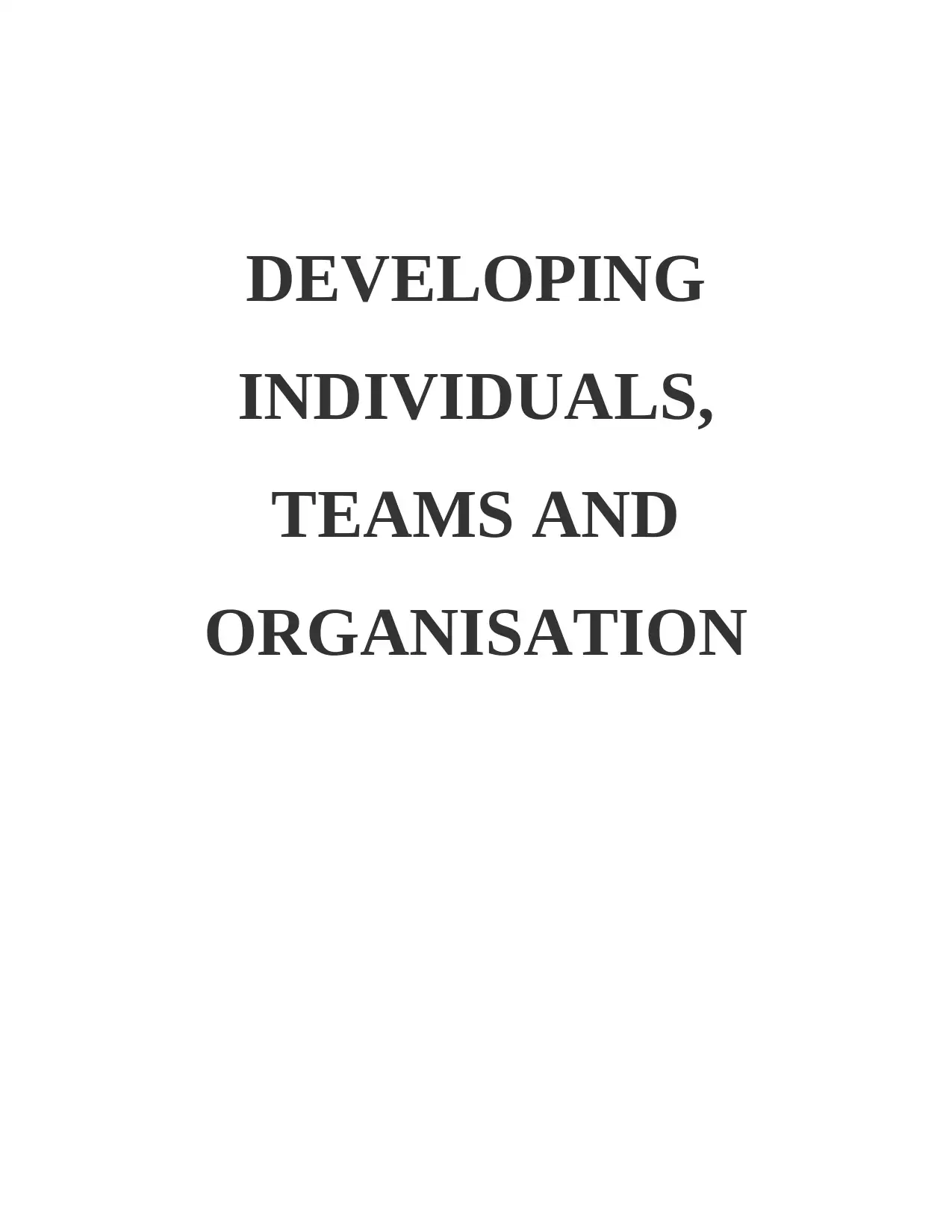
DEVELOPING
INDIVIDUALS,
TEAMS AND
ORGANISATION
INDIVIDUALS,
TEAMS AND
ORGANISATION
Paraphrase This Document
Need a fresh take? Get an instant paraphrase of this document with our AI Paraphraser
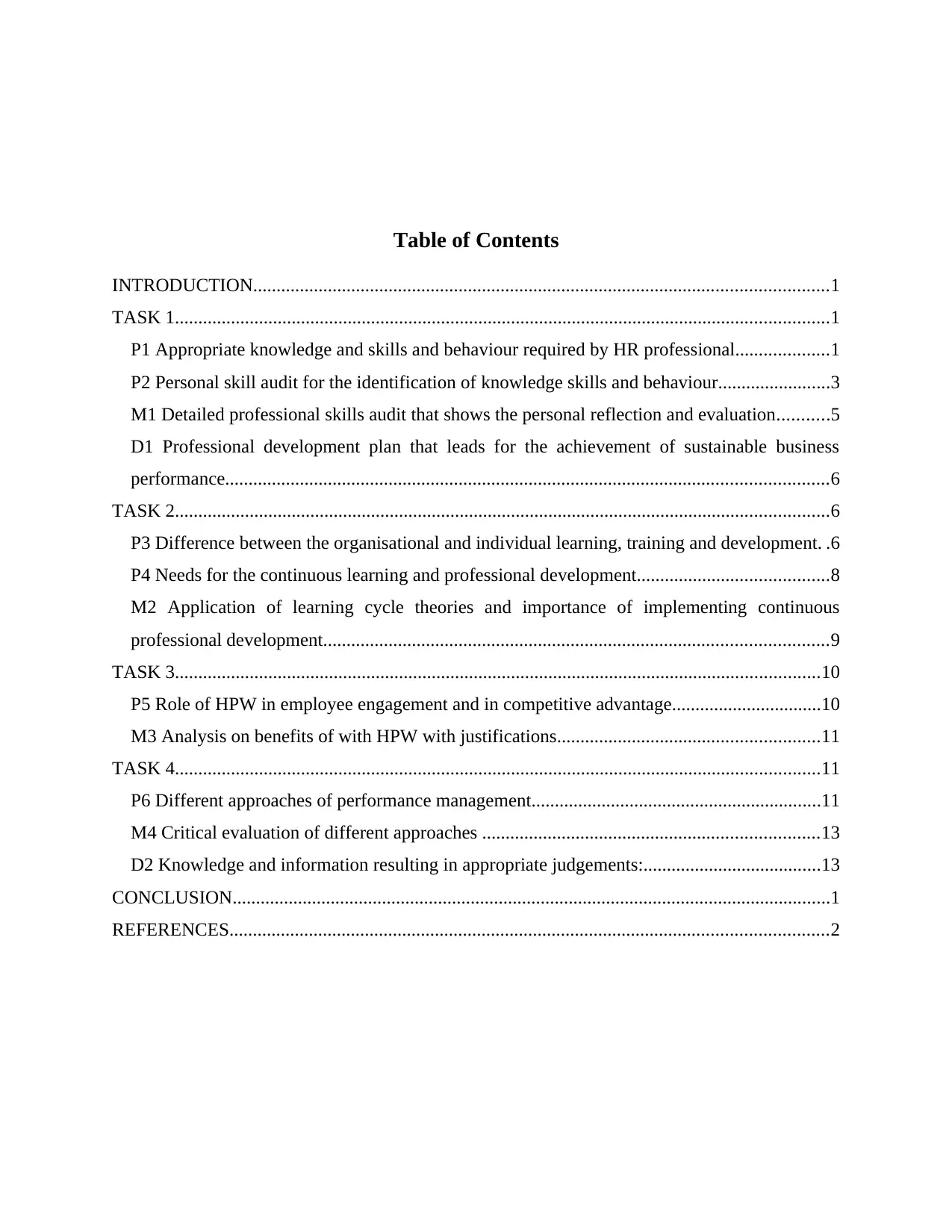
Table of Contents
INTRODUCTION...........................................................................................................................1
TASK 1............................................................................................................................................1
P1 Appropriate knowledge and skills and behaviour required by HR professional....................1
P2 Personal skill audit for the identification of knowledge skills and behaviour........................3
M1 Detailed professional skills audit that shows the personal reflection and evaluation...........5
D1 Professional development plan that leads for the achievement of sustainable business
performance.................................................................................................................................6
TASK 2............................................................................................................................................6
P3 Difference between the organisational and individual learning, training and development. .6
P4 Needs for the continuous learning and professional development.........................................8
M2 Application of learning cycle theories and importance of implementing continuous
professional development............................................................................................................9
TASK 3..........................................................................................................................................10
P5 Role of HPW in employee engagement and in competitive advantage................................10
M3 Analysis on benefits of with HPW with justifications........................................................11
TASK 4..........................................................................................................................................11
P6 Different approaches of performance management..............................................................11
M4 Critical evaluation of different approaches ........................................................................13
D2 Knowledge and information resulting in appropriate judgements:......................................13
CONCLUSION................................................................................................................................1
REFERENCES................................................................................................................................2
INTRODUCTION...........................................................................................................................1
TASK 1............................................................................................................................................1
P1 Appropriate knowledge and skills and behaviour required by HR professional....................1
P2 Personal skill audit for the identification of knowledge skills and behaviour........................3
M1 Detailed professional skills audit that shows the personal reflection and evaluation...........5
D1 Professional development plan that leads for the achievement of sustainable business
performance.................................................................................................................................6
TASK 2............................................................................................................................................6
P3 Difference between the organisational and individual learning, training and development. .6
P4 Needs for the continuous learning and professional development.........................................8
M2 Application of learning cycle theories and importance of implementing continuous
professional development............................................................................................................9
TASK 3..........................................................................................................................................10
P5 Role of HPW in employee engagement and in competitive advantage................................10
M3 Analysis on benefits of with HPW with justifications........................................................11
TASK 4..........................................................................................................................................11
P6 Different approaches of performance management..............................................................11
M4 Critical evaluation of different approaches ........................................................................13
D2 Knowledge and information resulting in appropriate judgements:......................................13
CONCLUSION................................................................................................................................1
REFERENCES................................................................................................................................2

⊘ This is a preview!⊘
Do you want full access?
Subscribe today to unlock all pages.

Trusted by 1+ million students worldwide
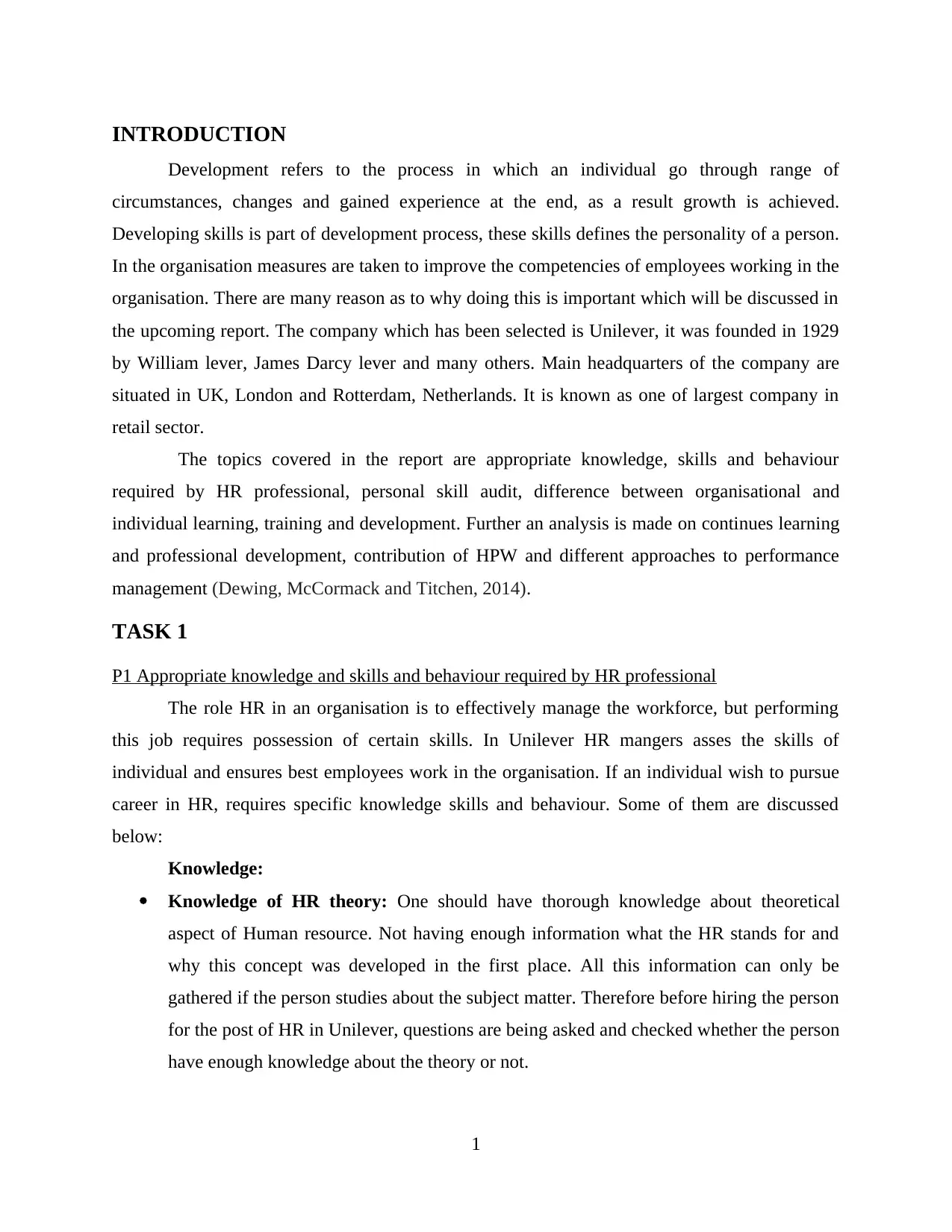
INTRODUCTION
Development refers to the process in which an individual go through range of
circumstances, changes and gained experience at the end, as a result growth is achieved.
Developing skills is part of development process, these skills defines the personality of a person.
In the organisation measures are taken to improve the competencies of employees working in the
organisation. There are many reason as to why doing this is important which will be discussed in
the upcoming report. The company which has been selected is Unilever, it was founded in 1929
by William lever, James Darcy lever and many others. Main headquarters of the company are
situated in UK, London and Rotterdam, Netherlands. It is known as one of largest company in
retail sector.
The topics covered in the report are appropriate knowledge, skills and behaviour
required by HR professional, personal skill audit, difference between organisational and
individual learning, training and development. Further an analysis is made on continues learning
and professional development, contribution of HPW and different approaches to performance
management (Dewing, McCormack and Titchen, 2014).
TASK 1
P1 Appropriate knowledge and skills and behaviour required by HR professional
The role HR in an organisation is to effectively manage the workforce, but performing
this job requires possession of certain skills. In Unilever HR mangers asses the skills of
individual and ensures best employees work in the organisation. If an individual wish to pursue
career in HR, requires specific knowledge skills and behaviour. Some of them are discussed
below:
Knowledge:
Knowledge of HR theory: One should have thorough knowledge about theoretical
aspect of Human resource. Not having enough information what the HR stands for and
why this concept was developed in the first place. All this information can only be
gathered if the person studies about the subject matter. Therefore before hiring the person
for the post of HR in Unilever, questions are being asked and checked whether the person
have enough knowledge about the theory or not.
1
Development refers to the process in which an individual go through range of
circumstances, changes and gained experience at the end, as a result growth is achieved.
Developing skills is part of development process, these skills defines the personality of a person.
In the organisation measures are taken to improve the competencies of employees working in the
organisation. There are many reason as to why doing this is important which will be discussed in
the upcoming report. The company which has been selected is Unilever, it was founded in 1929
by William lever, James Darcy lever and many others. Main headquarters of the company are
situated in UK, London and Rotterdam, Netherlands. It is known as one of largest company in
retail sector.
The topics covered in the report are appropriate knowledge, skills and behaviour
required by HR professional, personal skill audit, difference between organisational and
individual learning, training and development. Further an analysis is made on continues learning
and professional development, contribution of HPW and different approaches to performance
management (Dewing, McCormack and Titchen, 2014).
TASK 1
P1 Appropriate knowledge and skills and behaviour required by HR professional
The role HR in an organisation is to effectively manage the workforce, but performing
this job requires possession of certain skills. In Unilever HR mangers asses the skills of
individual and ensures best employees work in the organisation. If an individual wish to pursue
career in HR, requires specific knowledge skills and behaviour. Some of them are discussed
below:
Knowledge:
Knowledge of HR theory: One should have thorough knowledge about theoretical
aspect of Human resource. Not having enough information what the HR stands for and
why this concept was developed in the first place. All this information can only be
gathered if the person studies about the subject matter. Therefore before hiring the person
for the post of HR in Unilever, questions are being asked and checked whether the person
have enough knowledge about the theory or not.
1
Paraphrase This Document
Need a fresh take? Get an instant paraphrase of this document with our AI Paraphraser
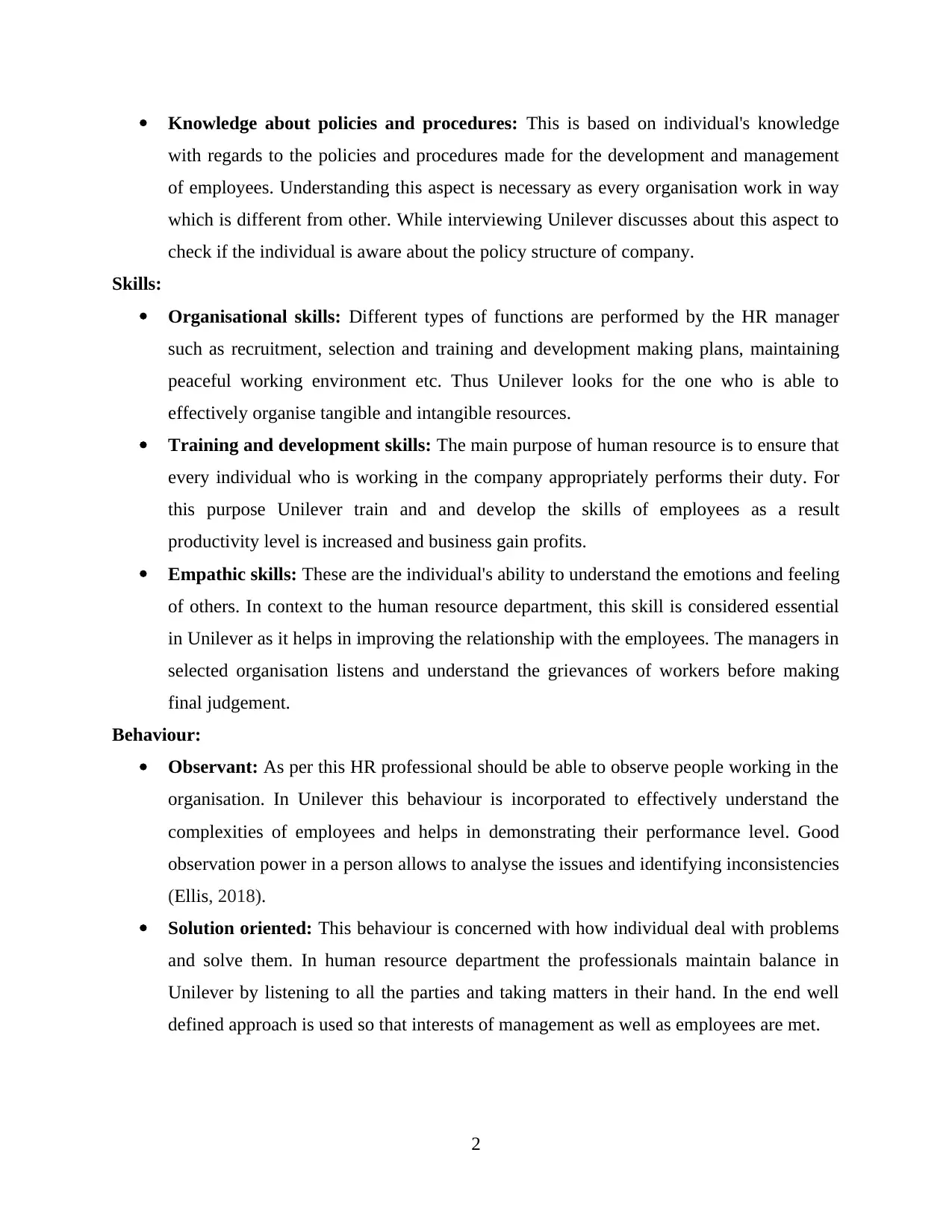
Knowledge about policies and procedures: This is based on individual's knowledge
with regards to the policies and procedures made for the development and management
of employees. Understanding this aspect is necessary as every organisation work in way
which is different from other. While interviewing Unilever discusses about this aspect to
check if the individual is aware about the policy structure of company.
Skills:
Organisational skills: Different types of functions are performed by the HR manager
such as recruitment, selection and training and development making plans, maintaining
peaceful working environment etc. Thus Unilever looks for the one who is able to
effectively organise tangible and intangible resources.
Training and development skills: The main purpose of human resource is to ensure that
every individual who is working in the company appropriately performs their duty. For
this purpose Unilever train and and develop the skills of employees as a result
productivity level is increased and business gain profits.
Empathic skills: These are the individual's ability to understand the emotions and feeling
of others. In context to the human resource department, this skill is considered essential
in Unilever as it helps in improving the relationship with the employees. The managers in
selected organisation listens and understand the grievances of workers before making
final judgement.
Behaviour:
Observant: As per this HR professional should be able to observe people working in the
organisation. In Unilever this behaviour is incorporated to effectively understand the
complexities of employees and helps in demonstrating their performance level. Good
observation power in a person allows to analyse the issues and identifying inconsistencies
(Ellis, 2018).
Solution oriented: This behaviour is concerned with how individual deal with problems
and solve them. In human resource department the professionals maintain balance in
Unilever by listening to all the parties and taking matters in their hand. In the end well
defined approach is used so that interests of management as well as employees are met.
2
with regards to the policies and procedures made for the development and management
of employees. Understanding this aspect is necessary as every organisation work in way
which is different from other. While interviewing Unilever discusses about this aspect to
check if the individual is aware about the policy structure of company.
Skills:
Organisational skills: Different types of functions are performed by the HR manager
such as recruitment, selection and training and development making plans, maintaining
peaceful working environment etc. Thus Unilever looks for the one who is able to
effectively organise tangible and intangible resources.
Training and development skills: The main purpose of human resource is to ensure that
every individual who is working in the company appropriately performs their duty. For
this purpose Unilever train and and develop the skills of employees as a result
productivity level is increased and business gain profits.
Empathic skills: These are the individual's ability to understand the emotions and feeling
of others. In context to the human resource department, this skill is considered essential
in Unilever as it helps in improving the relationship with the employees. The managers in
selected organisation listens and understand the grievances of workers before making
final judgement.
Behaviour:
Observant: As per this HR professional should be able to observe people working in the
organisation. In Unilever this behaviour is incorporated to effectively understand the
complexities of employees and helps in demonstrating their performance level. Good
observation power in a person allows to analyse the issues and identifying inconsistencies
(Ellis, 2018).
Solution oriented: This behaviour is concerned with how individual deal with problems
and solve them. In human resource department the professionals maintain balance in
Unilever by listening to all the parties and taking matters in their hand. In the end well
defined approach is used so that interests of management as well as employees are met.
2
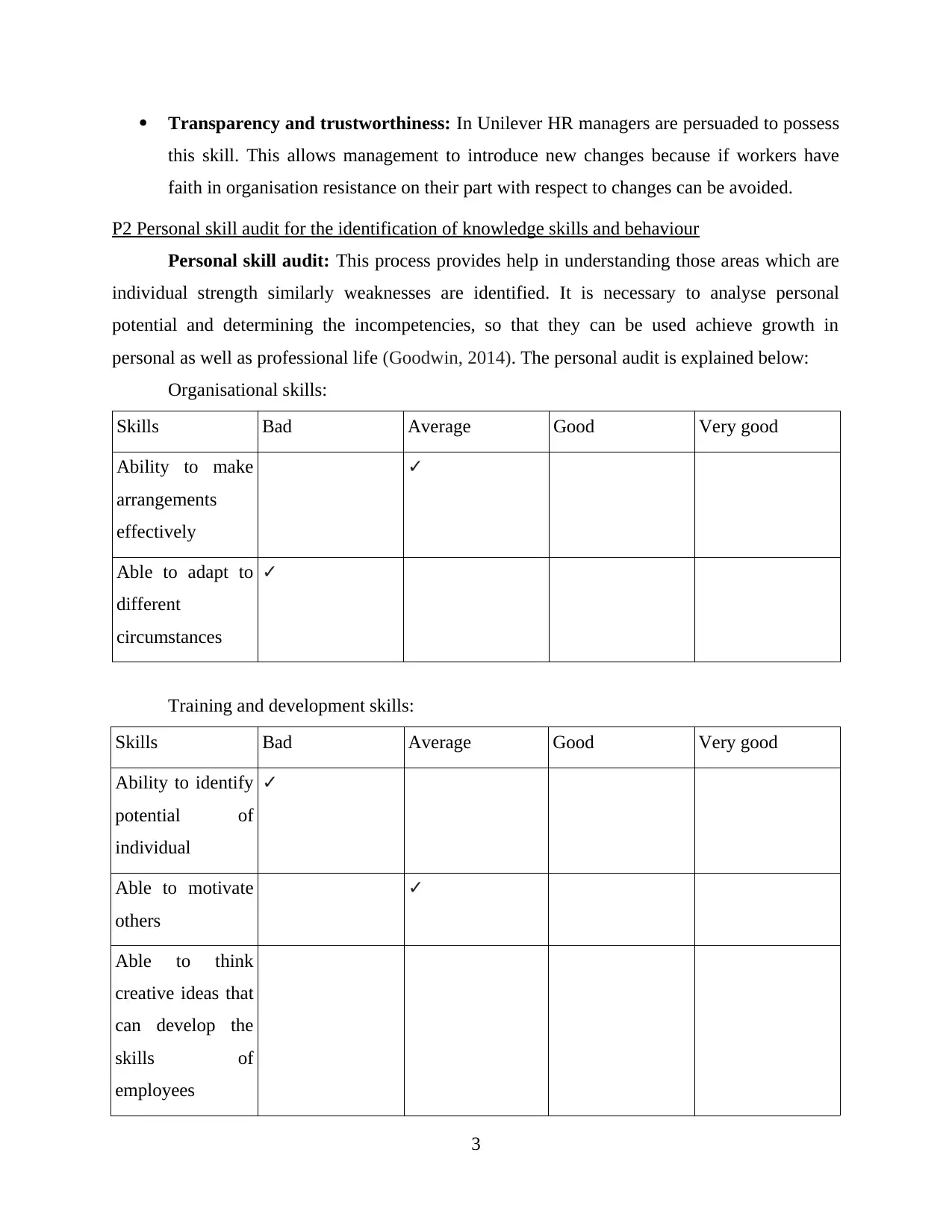
Transparency and trustworthiness: In Unilever HR managers are persuaded to possess
this skill. This allows management to introduce new changes because if workers have
faith in organisation resistance on their part with respect to changes can be avoided.
P2 Personal skill audit for the identification of knowledge skills and behaviour
Personal skill audit: This process provides help in understanding those areas which are
individual strength similarly weaknesses are identified. It is necessary to analyse personal
potential and determining the incompetencies, so that they can be used achieve growth in
personal as well as professional life (Goodwin, 2014). The personal audit is explained below:
Organisational skills:
Skills Bad Average Good Very good
Ability to make
arrangements
effectively
✓
Able to adapt to
different
circumstances
✓
Training and development skills:
Skills Bad Average Good Very good
Ability to identify
potential of
individual
✓
Able to motivate
others
✓
Able to think
creative ideas that
can develop the
skills of
employees
3
this skill. This allows management to introduce new changes because if workers have
faith in organisation resistance on their part with respect to changes can be avoided.
P2 Personal skill audit for the identification of knowledge skills and behaviour
Personal skill audit: This process provides help in understanding those areas which are
individual strength similarly weaknesses are identified. It is necessary to analyse personal
potential and determining the incompetencies, so that they can be used achieve growth in
personal as well as professional life (Goodwin, 2014). The personal audit is explained below:
Organisational skills:
Skills Bad Average Good Very good
Ability to make
arrangements
effectively
✓
Able to adapt to
different
circumstances
✓
Training and development skills:
Skills Bad Average Good Very good
Ability to identify
potential of
individual
✓
Able to motivate
others
✓
Able to think
creative ideas that
can develop the
skills of
employees
3
⊘ This is a preview!⊘
Do you want full access?
Subscribe today to unlock all pages.

Trusted by 1+ million students worldwide
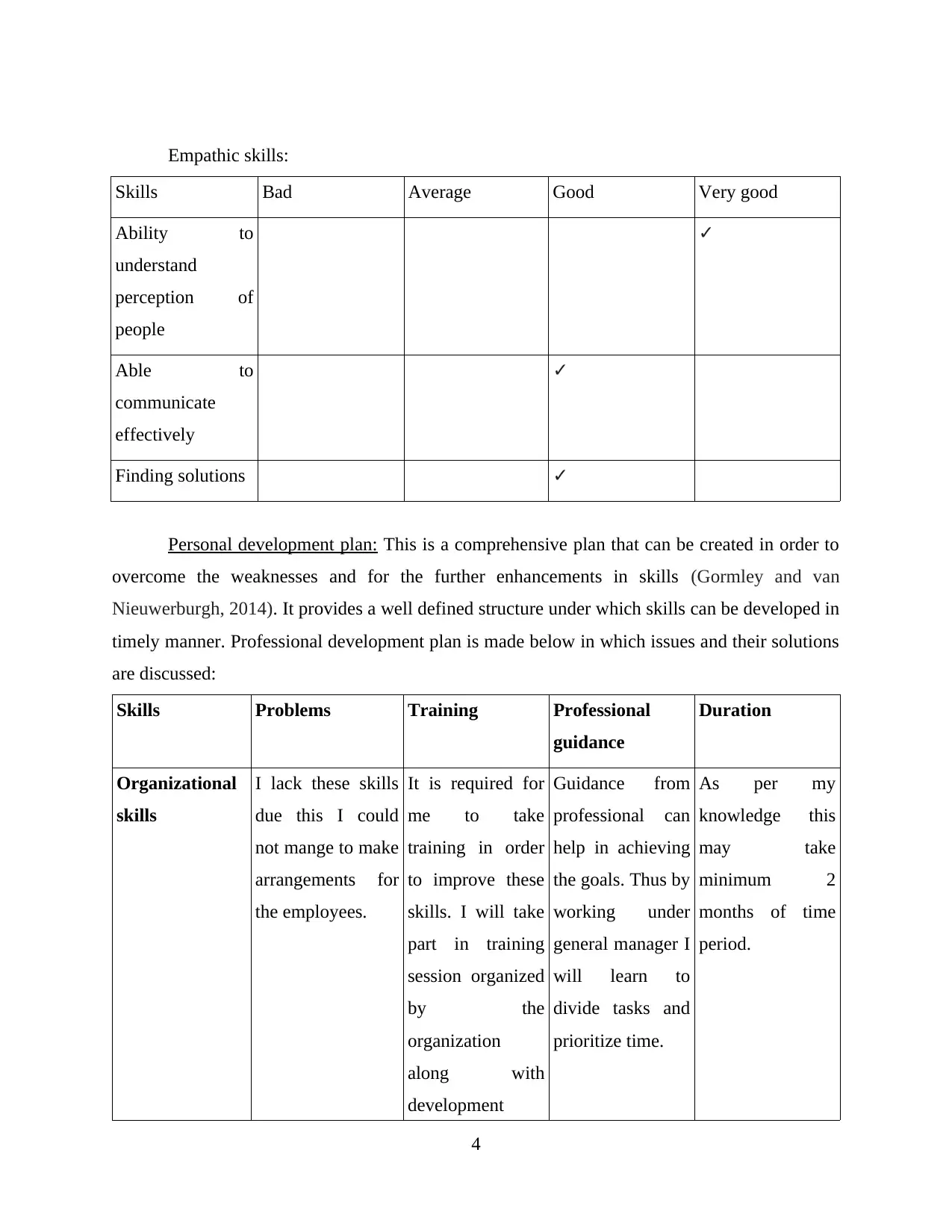
Empathic skills:
Skills Bad Average Good Very good
Ability to
understand
perception of
people
✓
Able to
communicate
effectively
✓
Finding solutions ✓
Personal development plan: This is a comprehensive plan that can be created in order to
overcome the weaknesses and for the further enhancements in skills (Gormley and van
Nieuwerburgh, 2014). It provides a well defined structure under which skills can be developed in
timely manner. Professional development plan is made below in which issues and their solutions
are discussed:
Skills Problems Training Professional
guidance
Duration
Organizational
skills
I lack these skills
due this I could
not mange to make
arrangements for
the employees.
It is required for
me to take
training in order
to improve these
skills. I will take
part in training
session organized
by the
organization
along with
development
Guidance from
professional can
help in achieving
the goals. Thus by
working under
general manager I
will learn to
divide tasks and
prioritize time.
As per my
knowledge this
may take
minimum 2
months of time
period.
4
Skills Bad Average Good Very good
Ability to
understand
perception of
people
✓
Able to
communicate
effectively
✓
Finding solutions ✓
Personal development plan: This is a comprehensive plan that can be created in order to
overcome the weaknesses and for the further enhancements in skills (Gormley and van
Nieuwerburgh, 2014). It provides a well defined structure under which skills can be developed in
timely manner. Professional development plan is made below in which issues and their solutions
are discussed:
Skills Problems Training Professional
guidance
Duration
Organizational
skills
I lack these skills
due this I could
not mange to make
arrangements for
the employees.
It is required for
me to take
training in order
to improve these
skills. I will take
part in training
session organized
by the
organization
along with
development
Guidance from
professional can
help in achieving
the goals. Thus by
working under
general manager I
will learn to
divide tasks and
prioritize time.
As per my
knowledge this
may take
minimum 2
months of time
period.
4
Paraphrase This Document
Need a fresh take? Get an instant paraphrase of this document with our AI Paraphraser
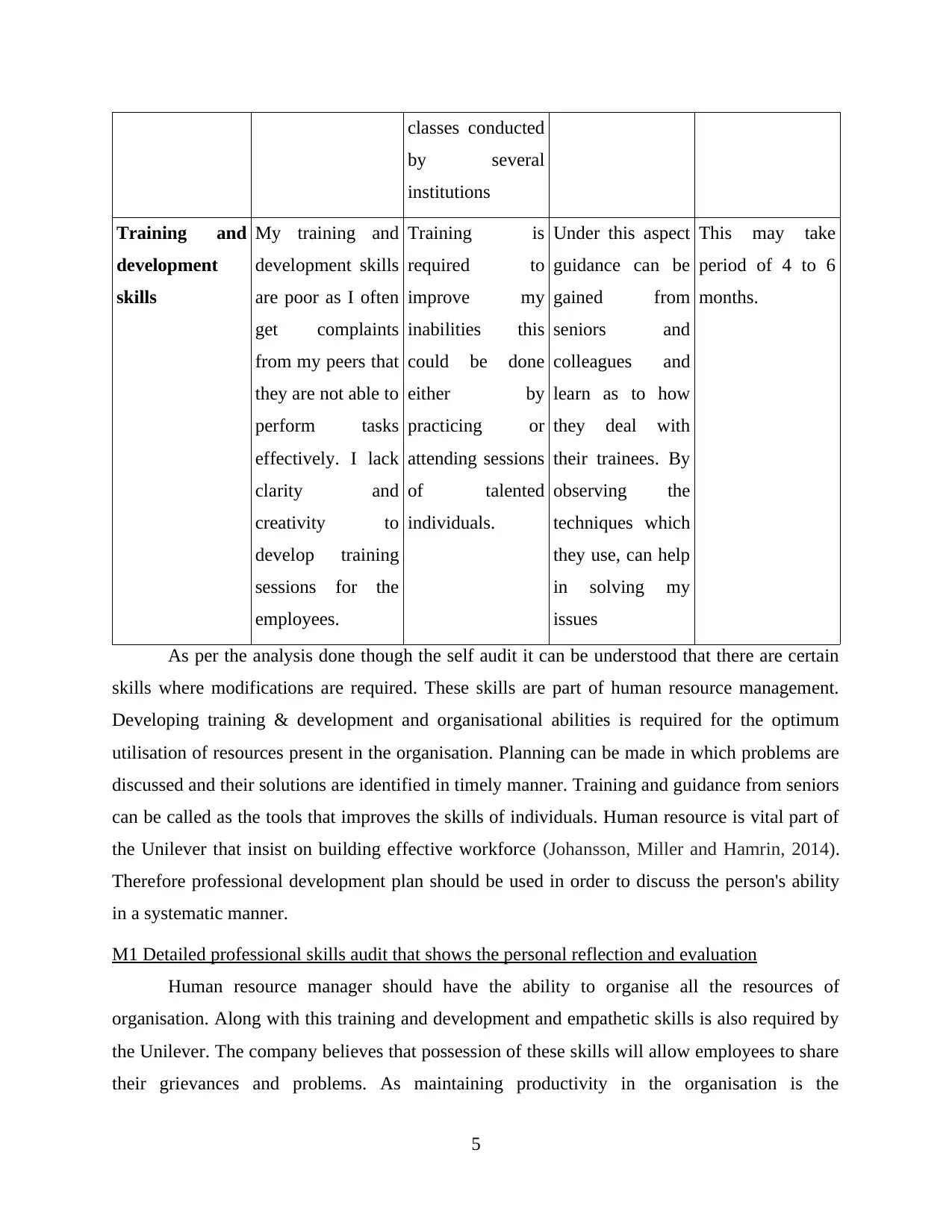
classes conducted
by several
institutions
Training and
development
skills
My training and
development skills
are poor as I often
get complaints
from my peers that
they are not able to
perform tasks
effectively. I lack
clarity and
creativity to
develop training
sessions for the
employees.
Training is
required to
improve my
inabilities this
could be done
either by
practicing or
attending sessions
of talented
individuals.
Under this aspect
guidance can be
gained from
seniors and
colleagues and
learn as to how
they deal with
their trainees. By
observing the
techniques which
they use, can help
in solving my
issues
This may take
period of 4 to 6
months.
As per the analysis done though the self audit it can be understood that there are certain
skills where modifications are required. These skills are part of human resource management.
Developing training & development and organisational abilities is required for the optimum
utilisation of resources present in the organisation. Planning can be made in which problems are
discussed and their solutions are identified in timely manner. Training and guidance from seniors
can be called as the tools that improves the skills of individuals. Human resource is vital part of
the Unilever that insist on building effective workforce (Johansson, Miller and Hamrin, 2014).
Therefore professional development plan should be used in order to discuss the person's ability
in a systematic manner.
M1 Detailed professional skills audit that shows the personal reflection and evaluation
Human resource manager should have the ability to organise all the resources of
organisation. Along with this training and development and empathetic skills is also required by
the Unilever. The company believes that possession of these skills will allow employees to share
their grievances and problems. As maintaining productivity in the organisation is the
5
by several
institutions
Training and
development
skills
My training and
development skills
are poor as I often
get complaints
from my peers that
they are not able to
perform tasks
effectively. I lack
clarity and
creativity to
develop training
sessions for the
employees.
Training is
required to
improve my
inabilities this
could be done
either by
practicing or
attending sessions
of talented
individuals.
Under this aspect
guidance can be
gained from
seniors and
colleagues and
learn as to how
they deal with
their trainees. By
observing the
techniques which
they use, can help
in solving my
issues
This may take
period of 4 to 6
months.
As per the analysis done though the self audit it can be understood that there are certain
skills where modifications are required. These skills are part of human resource management.
Developing training & development and organisational abilities is required for the optimum
utilisation of resources present in the organisation. Planning can be made in which problems are
discussed and their solutions are identified in timely manner. Training and guidance from seniors
can be called as the tools that improves the skills of individuals. Human resource is vital part of
the Unilever that insist on building effective workforce (Johansson, Miller and Hamrin, 2014).
Therefore professional development plan should be used in order to discuss the person's ability
in a systematic manner.
M1 Detailed professional skills audit that shows the personal reflection and evaluation
Human resource manager should have the ability to organise all the resources of
organisation. Along with this training and development and empathetic skills is also required by
the Unilever. The company believes that possession of these skills will allow employees to share
their grievances and problems. As maintaining productivity in the organisation is the
5
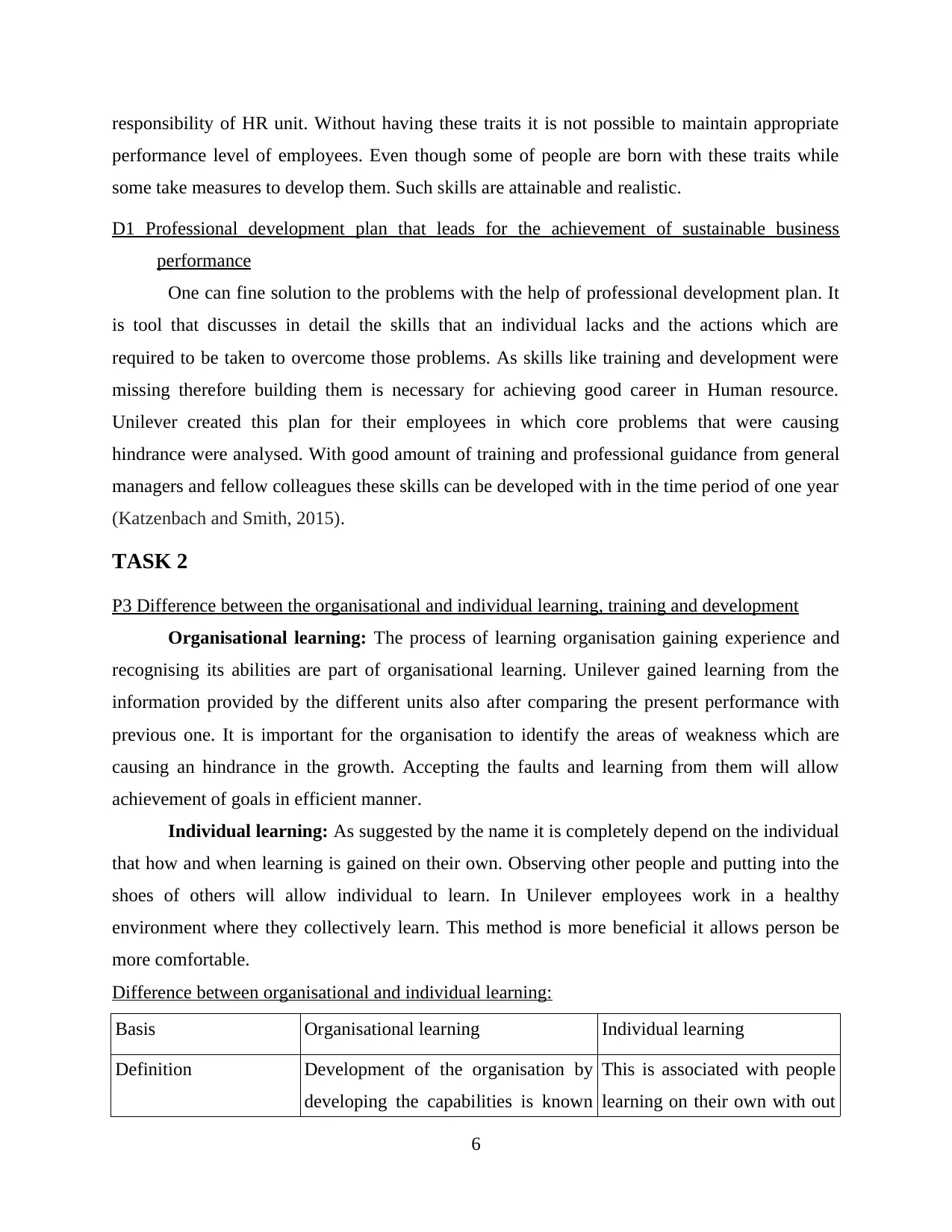
responsibility of HR unit. Without having these traits it is not possible to maintain appropriate
performance level of employees. Even though some of people are born with these traits while
some take measures to develop them. Such skills are attainable and realistic.
D1 Professional development plan that leads for the achievement of sustainable business
performance
One can fine solution to the problems with the help of professional development plan. It
is tool that discusses in detail the skills that an individual lacks and the actions which are
required to be taken to overcome those problems. As skills like training and development were
missing therefore building them is necessary for achieving good career in Human resource.
Unilever created this plan for their employees in which core problems that were causing
hindrance were analysed. With good amount of training and professional guidance from general
managers and fellow colleagues these skills can be developed with in the time period of one year
(Katzenbach and Smith, 2015).
TASK 2
P3 Difference between the organisational and individual learning, training and development
Organisational learning: The process of learning organisation gaining experience and
recognising its abilities are part of organisational learning. Unilever gained learning from the
information provided by the different units also after comparing the present performance with
previous one. It is important for the organisation to identify the areas of weakness which are
causing an hindrance in the growth. Accepting the faults and learning from them will allow
achievement of goals in efficient manner.
Individual learning: As suggested by the name it is completely depend on the individual
that how and when learning is gained on their own. Observing other people and putting into the
shoes of others will allow individual to learn. In Unilever employees work in a healthy
environment where they collectively learn. This method is more beneficial it allows person be
more comfortable.
Difference between organisational and individual learning:
Basis Organisational learning Individual learning
Definition Development of the organisation by
developing the capabilities is known
This is associated with people
learning on their own with out
6
performance level of employees. Even though some of people are born with these traits while
some take measures to develop them. Such skills are attainable and realistic.
D1 Professional development plan that leads for the achievement of sustainable business
performance
One can fine solution to the problems with the help of professional development plan. It
is tool that discusses in detail the skills that an individual lacks and the actions which are
required to be taken to overcome those problems. As skills like training and development were
missing therefore building them is necessary for achieving good career in Human resource.
Unilever created this plan for their employees in which core problems that were causing
hindrance were analysed. With good amount of training and professional guidance from general
managers and fellow colleagues these skills can be developed with in the time period of one year
(Katzenbach and Smith, 2015).
TASK 2
P3 Difference between the organisational and individual learning, training and development
Organisational learning: The process of learning organisation gaining experience and
recognising its abilities are part of organisational learning. Unilever gained learning from the
information provided by the different units also after comparing the present performance with
previous one. It is important for the organisation to identify the areas of weakness which are
causing an hindrance in the growth. Accepting the faults and learning from them will allow
achievement of goals in efficient manner.
Individual learning: As suggested by the name it is completely depend on the individual
that how and when learning is gained on their own. Observing other people and putting into the
shoes of others will allow individual to learn. In Unilever employees work in a healthy
environment where they collectively learn. This method is more beneficial it allows person be
more comfortable.
Difference between organisational and individual learning:
Basis Organisational learning Individual learning
Definition Development of the organisation by
developing the capabilities is known
This is associated with people
learning on their own with out
6
⊘ This is a preview!⊘
Do you want full access?
Subscribe today to unlock all pages.

Trusted by 1+ million students worldwide
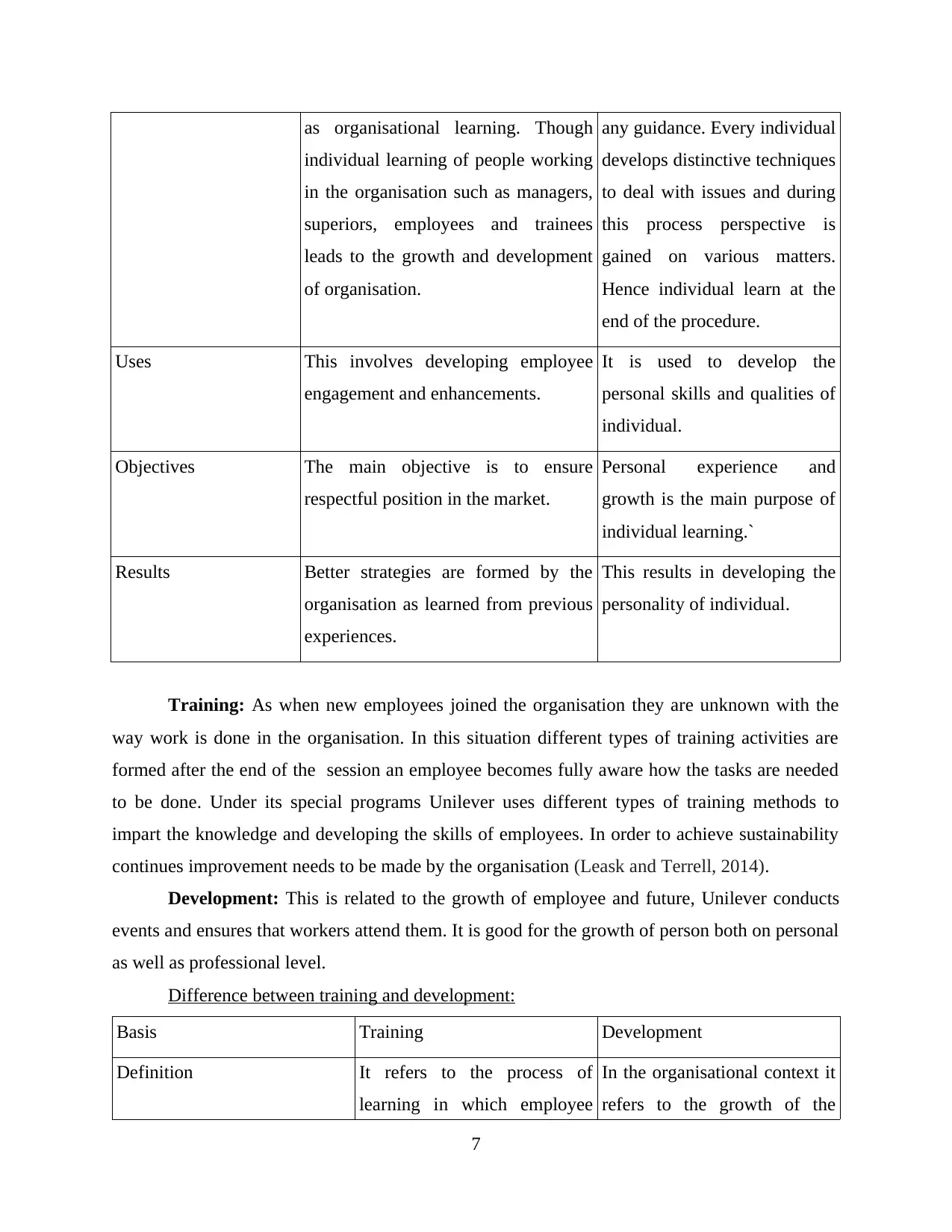
as organisational learning. Though
individual learning of people working
in the organisation such as managers,
superiors, employees and trainees
leads to the growth and development
of organisation.
any guidance. Every individual
develops distinctive techniques
to deal with issues and during
this process perspective is
gained on various matters.
Hence individual learn at the
end of the procedure.
Uses This involves developing employee
engagement and enhancements.
It is used to develop the
personal skills and qualities of
individual.
Objectives The main objective is to ensure
respectful position in the market.
Personal experience and
growth is the main purpose of
individual learning.`
Results Better strategies are formed by the
organisation as learned from previous
experiences.
This results in developing the
personality of individual.
Training: As when new employees joined the organisation they are unknown with the
way work is done in the organisation. In this situation different types of training activities are
formed after the end of the session an employee becomes fully aware how the tasks are needed
to be done. Under its special programs Unilever uses different types of training methods to
impart the knowledge and developing the skills of employees. In order to achieve sustainability
continues improvement needs to be made by the organisation (Leask and Terrell, 2014).
Development: This is related to the growth of employee and future, Unilever conducts
events and ensures that workers attend them. It is good for the growth of person both on personal
as well as professional level.
Difference between training and development:
Basis Training Development
Definition It refers to the process of
learning in which employee
In the organisational context it
refers to the growth of the
7
individual learning of people working
in the organisation such as managers,
superiors, employees and trainees
leads to the growth and development
of organisation.
any guidance. Every individual
develops distinctive techniques
to deal with issues and during
this process perspective is
gained on various matters.
Hence individual learn at the
end of the procedure.
Uses This involves developing employee
engagement and enhancements.
It is used to develop the
personal skills and qualities of
individual.
Objectives The main objective is to ensure
respectful position in the market.
Personal experience and
growth is the main purpose of
individual learning.`
Results Better strategies are formed by the
organisation as learned from previous
experiences.
This results in developing the
personality of individual.
Training: As when new employees joined the organisation they are unknown with the
way work is done in the organisation. In this situation different types of training activities are
formed after the end of the session an employee becomes fully aware how the tasks are needed
to be done. Under its special programs Unilever uses different types of training methods to
impart the knowledge and developing the skills of employees. In order to achieve sustainability
continues improvement needs to be made by the organisation (Leask and Terrell, 2014).
Development: This is related to the growth of employee and future, Unilever conducts
events and ensures that workers attend them. It is good for the growth of person both on personal
as well as professional level.
Difference between training and development:
Basis Training Development
Definition It refers to the process of
learning in which employee
In the organisational context it
refers to the growth of the
7
Paraphrase This Document
Need a fresh take? Get an instant paraphrase of this document with our AI Paraphraser
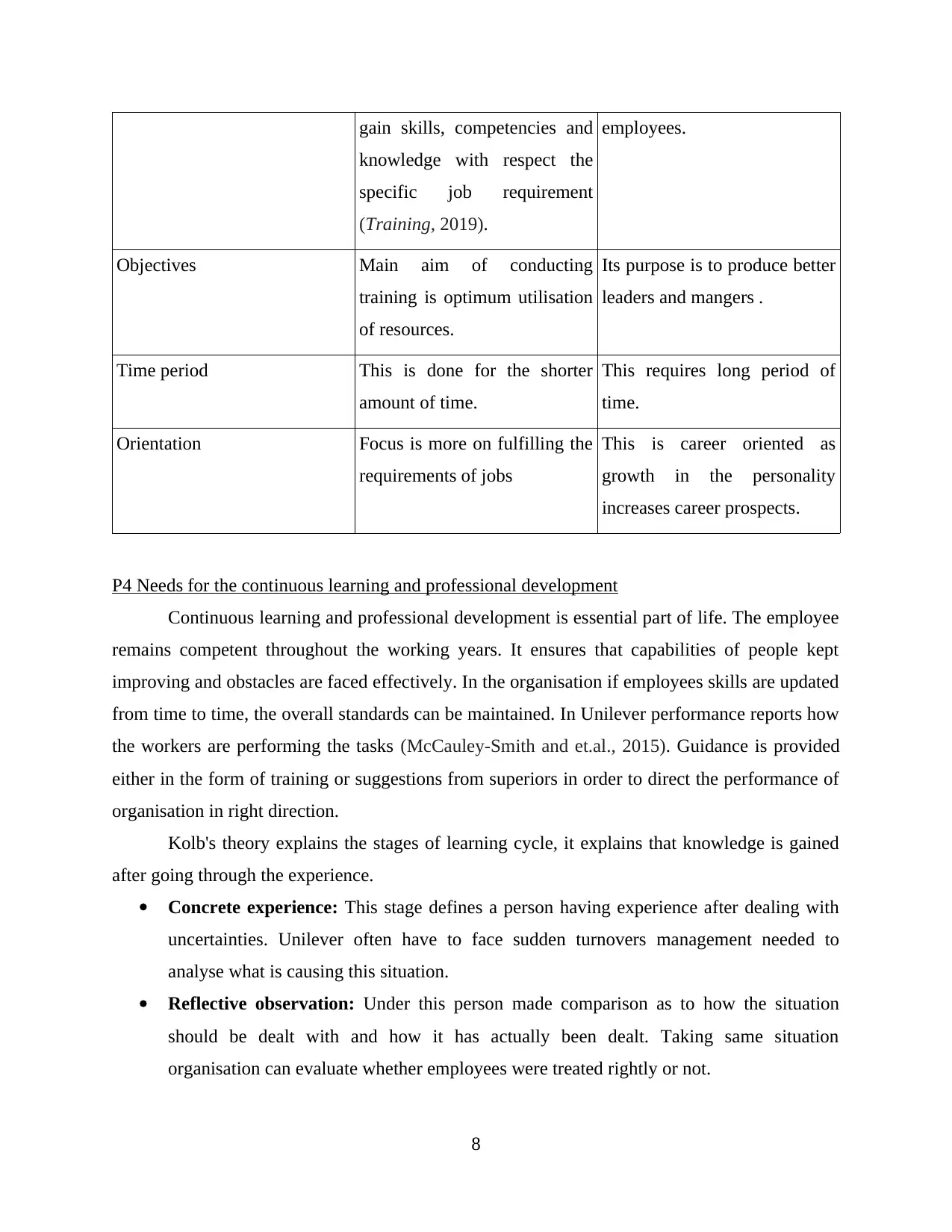
gain skills, competencies and
knowledge with respect the
specific job requirement
(Training, 2019).
employees.
Objectives Main aim of conducting
training is optimum utilisation
of resources.
Its purpose is to produce better
leaders and mangers .
Time period This is done for the shorter
amount of time.
This requires long period of
time.
Orientation Focus is more on fulfilling the
requirements of jobs
This is career oriented as
growth in the personality
increases career prospects.
P4 Needs for the continuous learning and professional development
Continuous learning and professional development is essential part of life. The employee
remains competent throughout the working years. It ensures that capabilities of people kept
improving and obstacles are faced effectively. In the organisation if employees skills are updated
from time to time, the overall standards can be maintained. In Unilever performance reports how
the workers are performing the tasks (McCauley-Smith and et.al., 2015). Guidance is provided
either in the form of training or suggestions from superiors in order to direct the performance of
organisation in right direction.
Kolb's theory explains the stages of learning cycle, it explains that knowledge is gained
after going through the experience.
Concrete experience: This stage defines a person having experience after dealing with
uncertainties. Unilever often have to face sudden turnovers management needed to
analyse what is causing this situation.
Reflective observation: Under this person made comparison as to how the situation
should be dealt with and how it has actually been dealt. Taking same situation
organisation can evaluate whether employees were treated rightly or not.
8
knowledge with respect the
specific job requirement
(Training, 2019).
employees.
Objectives Main aim of conducting
training is optimum utilisation
of resources.
Its purpose is to produce better
leaders and mangers .
Time period This is done for the shorter
amount of time.
This requires long period of
time.
Orientation Focus is more on fulfilling the
requirements of jobs
This is career oriented as
growth in the personality
increases career prospects.
P4 Needs for the continuous learning and professional development
Continuous learning and professional development is essential part of life. The employee
remains competent throughout the working years. It ensures that capabilities of people kept
improving and obstacles are faced effectively. In the organisation if employees skills are updated
from time to time, the overall standards can be maintained. In Unilever performance reports how
the workers are performing the tasks (McCauley-Smith and et.al., 2015). Guidance is provided
either in the form of training or suggestions from superiors in order to direct the performance of
organisation in right direction.
Kolb's theory explains the stages of learning cycle, it explains that knowledge is gained
after going through the experience.
Concrete experience: This stage defines a person having experience after dealing with
uncertainties. Unilever often have to face sudden turnovers management needed to
analyse what is causing this situation.
Reflective observation: Under this person made comparison as to how the situation
should be dealt with and how it has actually been dealt. Taking same situation
organisation can evaluate whether employees were treated rightly or not.
8
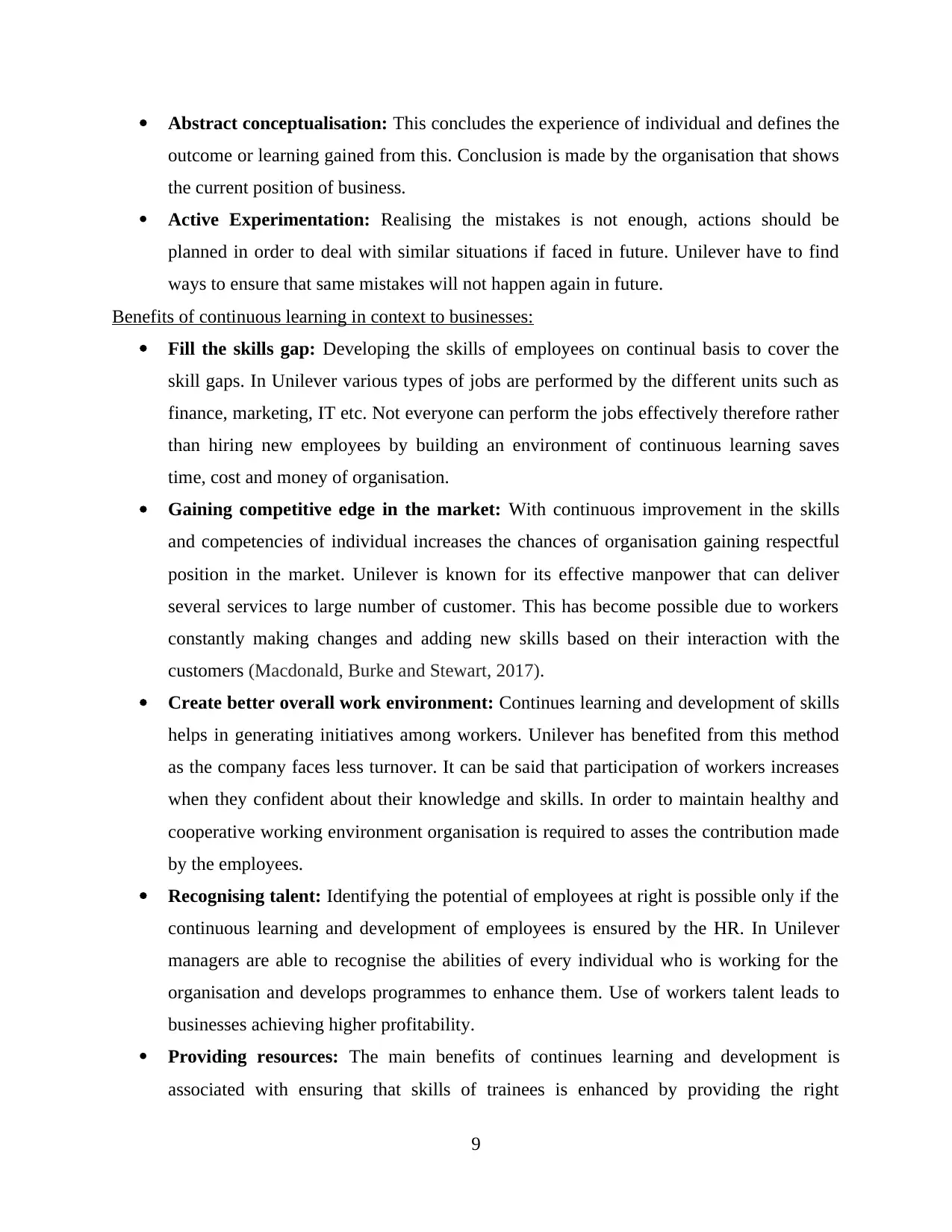
Abstract conceptualisation: This concludes the experience of individual and defines the
outcome or learning gained from this. Conclusion is made by the organisation that shows
the current position of business.
Active Experimentation: Realising the mistakes is not enough, actions should be
planned in order to deal with similar situations if faced in future. Unilever have to find
ways to ensure that same mistakes will not happen again in future.
Benefits of continuous learning in context to businesses:
Fill the skills gap: Developing the skills of employees on continual basis to cover the
skill gaps. In Unilever various types of jobs are performed by the different units such as
finance, marketing, IT etc. Not everyone can perform the jobs effectively therefore rather
than hiring new employees by building an environment of continuous learning saves
time, cost and money of organisation.
Gaining competitive edge in the market: With continuous improvement in the skills
and competencies of individual increases the chances of organisation gaining respectful
position in the market. Unilever is known for its effective manpower that can deliver
several services to large number of customer. This has become possible due to workers
constantly making changes and adding new skills based on their interaction with the
customers (Macdonald, Burke and Stewart, 2017).
Create better overall work environment: Continues learning and development of skills
helps in generating initiatives among workers. Unilever has benefited from this method
as the company faces less turnover. It can be said that participation of workers increases
when they confident about their knowledge and skills. In order to maintain healthy and
cooperative working environment organisation is required to asses the contribution made
by the employees.
Recognising talent: Identifying the potential of employees at right is possible only if the
continuous learning and development of employees is ensured by the HR. In Unilever
managers are able to recognise the abilities of every individual who is working for the
organisation and develops programmes to enhance them. Use of workers talent leads to
businesses achieving higher profitability.
Providing resources: The main benefits of continues learning and development is
associated with ensuring that skills of trainees is enhanced by providing the right
9
outcome or learning gained from this. Conclusion is made by the organisation that shows
the current position of business.
Active Experimentation: Realising the mistakes is not enough, actions should be
planned in order to deal with similar situations if faced in future. Unilever have to find
ways to ensure that same mistakes will not happen again in future.
Benefits of continuous learning in context to businesses:
Fill the skills gap: Developing the skills of employees on continual basis to cover the
skill gaps. In Unilever various types of jobs are performed by the different units such as
finance, marketing, IT etc. Not everyone can perform the jobs effectively therefore rather
than hiring new employees by building an environment of continuous learning saves
time, cost and money of organisation.
Gaining competitive edge in the market: With continuous improvement in the skills
and competencies of individual increases the chances of organisation gaining respectful
position in the market. Unilever is known for its effective manpower that can deliver
several services to large number of customer. This has become possible due to workers
constantly making changes and adding new skills based on their interaction with the
customers (Macdonald, Burke and Stewart, 2017).
Create better overall work environment: Continues learning and development of skills
helps in generating initiatives among workers. Unilever has benefited from this method
as the company faces less turnover. It can be said that participation of workers increases
when they confident about their knowledge and skills. In order to maintain healthy and
cooperative working environment organisation is required to asses the contribution made
by the employees.
Recognising talent: Identifying the potential of employees at right is possible only if the
continuous learning and development of employees is ensured by the HR. In Unilever
managers are able to recognise the abilities of every individual who is working for the
organisation and develops programmes to enhance them. Use of workers talent leads to
businesses achieving higher profitability.
Providing resources: The main benefits of continues learning and development is
associated with ensuring that skills of trainees is enhanced by providing the right
9
⊘ This is a preview!⊘
Do you want full access?
Subscribe today to unlock all pages.

Trusted by 1+ million students worldwide
1 out of 18
Related Documents
Your All-in-One AI-Powered Toolkit for Academic Success.
+13062052269
info@desklib.com
Available 24*7 on WhatsApp / Email
![[object Object]](/_next/static/media/star-bottom.7253800d.svg)
Unlock your academic potential
Copyright © 2020–2026 A2Z Services. All Rights Reserved. Developed and managed by ZUCOL.



